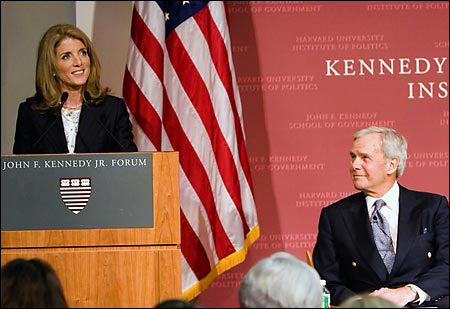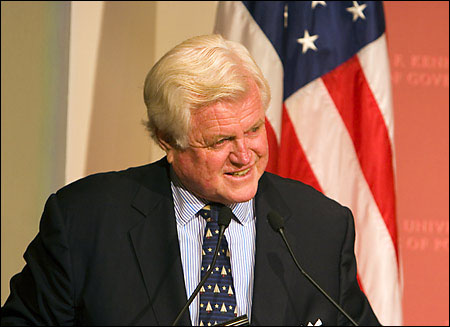‘Not just politics as usual’
Kennedy School pays tribute to JFK Jr., George

When George magazine burst onto the scene in September 1995 – with an attention-grabbing inaugural cover featuring supermodel Cindy Crawford as George Washington – Americans came face-to-face with a new reality, one that intertwined politics and pop culture in a provocative and oftentimes high-octane blend. How that blend attempted to move a generation was the focus of discussion last night at a Kennedy School of Government forum.
“Not Just Politics as Usual …” was labeled as a celebration of the 10th anniversary of the founding of George by John F. Kennedy Jr., the late president’s son who spoke of his inspiration to make politics entertaining and to engage younger people in the political process.
“Starting George was a bold and unconventional move, which is why it was perfect for John,” his sister Caroline Kennedy Schlossberg told the audience. “John was one of those revolutionary spirits … and George was his way to reach people on the issues of the day.”
A panel moderated by former NBC News anchor Tom Brokaw, and featuring Fox News Chairman Roger Ailes, political analyst Paul Begala, and Rock the Vote President Jehmu Greene, analyzed how George left its own imprint on the American culture. Former President Bill Clinton and California Gov. Arnold Schwarzenegger joined the discussion by satellite.
“John wanted to force this country to look at politics in fresh and interesting ways … and he did it with passion,” Brokaw remarked.

During its brief lifespan, the magazine probed issues as diverse and divisive as religion and politics, women and politics, abortion and media censorship, and profiled leaders and celebrities alike – from Ronald Reagan to Colin Powell to Michael J. Fox.
“I think he saw that people don’t divide their lives between politics and culture,” Clinton remarked. The former president pointed to three recent trends – the proliferation of democracy in the world, the growth of the Internet, and the rise in nongovernmental organizations – as integral factors in the blurring of the lines between the two.
Begala spoke of current efforts to make politics more engaging and more fun, particularly for younger people. “Some of it is trying to reach people where they live – make it relevant and make it interesting,” he said. “I think that is what John Kennedy was trying to do.”
Sen. Edward Kennedy (D-Mass.) concluded the evening with a moving tribute to his nephew. “He brought [popular culture and politics] together in a new and creative way,” the senator said. “He was far ahead of his time.”




